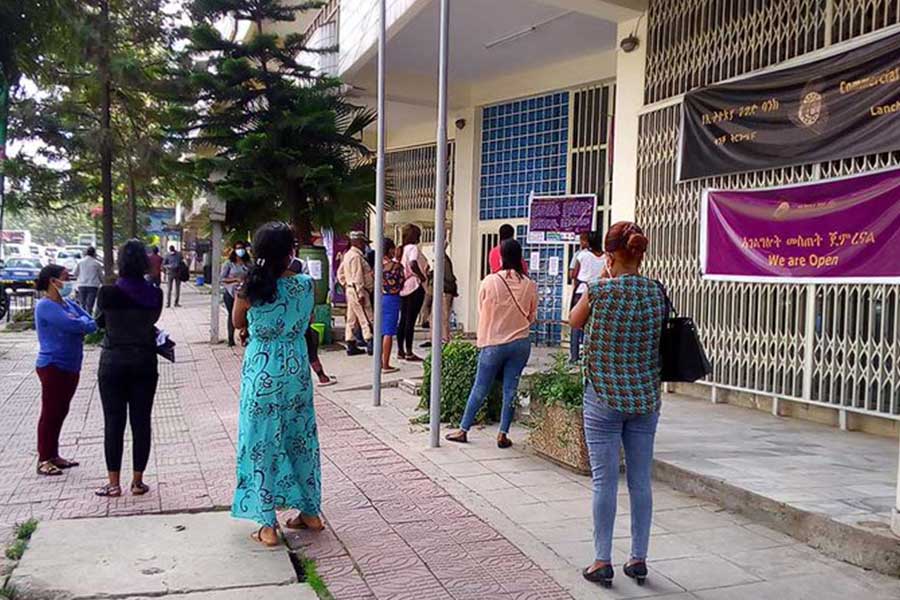
News Analysis | Dec 09,2023
Dec 4 , 2020
By
In times of crisis, the economy is usually the first port of call for disaster - and the impact can be felt for many years after. History has proven there are two certain things when it comes to financial crises, according to the Bank of England - another one will follow, and it will be different from the last one.
Our world has changed dramatically over the best part of a year. A rare disaster of a global pandemic never before seen in our lifetime has resulted in countries introducing necessary quarantines and social distancing measures in a bid to curb the spread of the virus. This has had a negative but necessary effect on our economies. A crisis bringing great uncertainty, governments are providing support to workers, businesses and financial markets to guide us toward a strong recovery. However, there is doubt about what our global economic landscape will look like when things return to normal.
Policymakers have had the difficult decision of when to implement lockdown, the severity of restrictions, and how long to keep measures in place for. Lockdown restrictions have been met with both open arms and criticism in places all over the world. For instance, in South Africa, the strictest measures were put in place to combat some of the highest levels of the virus. The country banned the sale of alcohol and tobacco.
Although saving lives, there are devastating effects for global economies, with spending plummeting to all-time lows. In states in the US such as Arizona, Texas and Utah, where the number of COVID-19 cases was rising dramatically, spending has started to contract, according to research by financial firm Jefferies. When comparing state data on Google that looks into retail and recreation establishments, states with high numbers of infections are performing considerably worse than others.
Denmark and Sweden approached lockdown quite differently, with Sweden choosing to trust its people to behave responsibly rather than enforce a lockdown. Meanwhile, Denmark introduced one of the earliest and strictest lockdowns. Although Sweden’s death rate was five times higher than Denmark’s, the economic impact was similar.
The reason for that is that people change their behaviour whether there is a lockdown or not, says Dhaval Joshi of BCA Research. They avoid public transport, stay away from shops, and refuse to send their children to school. Joshi argued that this is because people change their behaviour whether there is a lockdown or not, avoiding public transport, staying home where possible, and refusing to send their children to school.
It is possible to look broadly at how long countries were in lockdown to see if there is a link between economic damage and lockdowns by researching dates where lockdown was first introduced in a country and ending on the date they were gradually lifted.
A valuable tool here is 2019’s GDP for each country and 2020 forecast figures from Trading Economics.
The countries that have experienced the highest contraction of GDP are Russia (-26pc), UK(-19pc), South Africa (-16pc), Spain (-14pc) and Hungary (-14%). Those that experienced the lowest contraction were Australia (-5pc), Switzerland (-8pc), Canada (-8pc), Italy (-10pc) and Norway (-11pc). The United States is not included as it did not enter an overall nationwide lockdown, rather each state had its own lockdown.
From the data, only two of these countries featured in the top five for lockdown length. The UK experienced the longest lockdown at 99 days, and Spain was second with 98 days.
Three of the five countries that have spent the least amount of time in lockdown have experienced the lowest contraction in GDP. Switzerland experienced 42 days in lockdown, and Australia and Canada experienced 49 days.
Were lockdowns worth it then?
There is no pattern reflecting the idea that more days in lockdown had a stronger negative effect on GDP. Despite having locked down for 28 days longer, Spain and Hungary are both projected to take a -14pc hit to their overall GDP, for instance. Similarly, despite France locking down for 26 more days, both it and Germany are expected to see a -12pc drop to their GDP in 2020.
It is possible that there are other contributing factors then, including what was demonstrated and discussed previously with Sweden and Denmark. Regardless of the length of time, it doesn't seem like a long lockdown has impacted GDP more in comparison to a short lockdown. It is possible that people's overall behaviours have more of an influence, with populations behaving differently in a pandemic regardless.
While the uncertainty from COVID-19 continues, its impact is felt differently across different countries, according to McKinsey. There is a significant difference in how consumers are responding to the crisis and adapting to the next normal.
The United States was unique in that it did not introduce a nationwide lockdown and instead allowed states to set their own rules. For instance, California was the first state to order lockdown on March 20. Looking at 2020’s forecast, the state’s GDP is set to grow.
We are currently in the second wave of the virus, with many countries undergoing a second lockdown. This could have further unprecedented negative effects, especially in economies that have already been struggling such as Spain and South Africa.
While lockdown is necessary to save lives, it has no doubt been a controversial topic globally. Utilising lockdowns wisely and effectively is integral to protect both lives and countries, but it is important that we understand the impact socially and financially.
PUBLISHED ON
Dec 04,2020 [ VOL
21 , NO
1075]

News Analysis | Dec 09,2023

Radar | May 31,2025

Fortune News | May 24,2021

Commentaries | Feb 22,2020

Viewpoints | Feb 23,2019

Editorial | Jun 08,2024

Fortune News | Jun 20,2020

News Analysis | Oct 27,2024

Commentaries | Jan 09,2021

Editorial | Dec 19,2018

My Opinion | 132038 Views | Aug 14,2021

My Opinion | 128435 Views | Aug 21,2021

My Opinion | 126362 Views | Sep 10,2021

My Opinion | 123981 Views | Aug 07,2021





Dec 22 , 2024 . By TIZITA SHEWAFERAW
Charged with transforming colossal state-owned enterprises into modern and competitiv...

Aug 18 , 2024 . By AKSAH ITALO
Although predictable Yonas Zerihun's job in the ride-hailing service is not immune to...

Jul 28 , 2024 . By TIZITA SHEWAFERAW
Unhabitual, perhaps too many, Samuel Gebreyohannes, 38, used to occasionally enjoy a couple of beers at breakfast. However, he recently swit...

Jul 13 , 2024 . By AKSAH ITALO
Investors who rely on tractors, trucks, and field vehicles for commuting, transporting commodities, and f...

Jul 12 , 2025
Political leaders and their policy advisors often promise great leaps forward, yet th...

Jul 5 , 2025
Six years ago, Ethiopia was the darling of international liberal commentators. A year...

Jun 28 , 2025
Meseret Damtie, the assertive auditor general, has never been shy about naming names...

Jun 21 , 2025
A well-worn adage says, “Budget is not destiny, but it is direction.” Examining t...

Jul 13 , 2025 . By YITBAREK GETACHEW
The Addis Abeba City Revenue Bureau has introduced a new directive set to reshape how...

Jul 13 , 2025 . By BEZAWIT HULUAGER
Addis Abeba has approved a record 350 billion Br budget for the 2025/26 fiscal year,...

Jul 13 , 2025 . By RUTH BERHANU
The Addis Abeba Revenue Bureau has scrapped a value-added tax (VAT) on unprocessed ve...

Jul 13 , 2025 . By NAHOM AYELE
Federal lawmakers have finally brought closure to a protracted and contentious tax de...